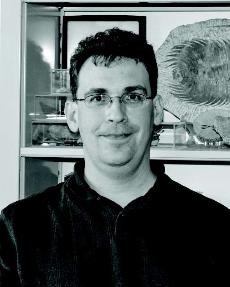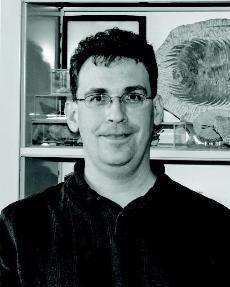
(Oren Jakobson)
Young: Tell me about how you came to Lawrence, and how you got interested in chemistry.
Hall: Well, I went to undergrad at Butler University in Indianapolis. I started out in undergraduate as a physical chemist, but then I took biochemistry my junior year and really loved the combination of biology and chemistry. I took a bunch of biology classes my senior year, and didn’t know what I wanted to do when I went to graduate school. I knew I enjoyed teaching, because [while at Butler] I got two opportunities [to teach]. The first was that the organic [chemistry] teacher would go skiing, for long ski weekends, and he trusted me, as a student, to give lectures. I also spent a lot of time doing tutoring. I went to graduate school at UW-Madison. Because I didn’t know what I wanted to do [within the sciences], I applied to a program that gives you access to hundreds of different faculty [members], and as a graduate student you attend talks and figure out what you want to do. I became a biochemist working with viruses. I ended up going with virology because then I could develop drugs that combat the common cold, and on the other hand look at the biochemistry of the virus as well. I didn’t have any chance to teach at all [in grad school], until my last year when all the grants ran out. I had to TA at that point. During that time I worked with the biocore program and took classes on how to teach, and by then I had decided I wanted to work at a small school. I went back to Butler and taught for a while [after graduate school] as a visiting assistant professor, and searched for a job. It’s pretty hard to get a job like this! I took a post-doc in Madison and kept searching. Over that period of time, I learned I liked undergraduate research with students a lot. Lawrence is the perfect combination of things [for that type of work]. It has a term system, which makes it easy to find time to do research and interact a lot with students, and it also has a music school and performing arts, so you can get out of the “science bubble” to do other things.
Young: Are you doing any research now?
Hall: Oh, yes, I still do a lot of research. That’s another one of the pluses of a smaller school. At a big school, you can only have one project and you always have to be worrying about funding, and the most expensive thing is paying people. Here, students are interested in just getting the experience, so for us the most expensive thing is getting the reagents and the equipment. Once you get started, you can open up lots of small projects, with the idea that they’ll be published in some way. Everything that we’ve done has wound up either as a paper or an honors thesis, or will be an honors thesis. Looking at asthma exacerbation, for example, is one of the core projects right now. Viruses are really neat because they’ve figured out how the body works, and we still haven’t figured it out, so if you can understand how a virus works, you can figure out how various biochemical processes work. A lot of these original things were discovered using viruses. I didn’t get into viruses as much for diseases, but rather for their tremendous variety, [for] how they can inform the biochemistry of the body.
Young: What do you do in your spare time?
Hall: Oh my gosh! I’ve learned Chinese painting from one of my students. I grow carnivorous plants. I grow orchids for Habitat for Humanity, or the rowing club orchid sales. At my house I have a ten [foot] by ten [foot] orchid/carnivorous plants room. I tend to grow smaller carnivorous plants, and you just feed them by throwing any piece of fruit in the terrarium that has fruit fly eggs on it. The fruit flies hatch and they fall into the traps of the plants. It’s a pretty simple process. I don’t raise orchids from seeds anymore, but I’m very interested in the tissue culture. From a biochemical standpoint, orchids can be difficult to grow or start from seed, because they don’t come with their own food, so they have to fall where there is enough food for them to grow. It’s one of those fascinations that a lot of scientists have had. Fossil collecting! Some of them were found on eBay, and some of them are replicas. I have a large collection of trilobite fossils. I’m interested in evolution, and trilobites were right there at the beginning of the world, but, of course, now they’re gone. That’s one of those lifelong dreams: “By God, I’m going to find myself a trilobite one of these days.” You go out and look [for trilobites] but then you don’t have much luck. Yes, I have all different kinds of collections. I have an autographed book collection, a beer glass collection and the very old Apple II computer that I did my papers on. I was an Apple fan before [the] Mac was famous or important. It still works and you can still play games on it! I build kites. That’s just kind of a sample of what I like to do. And then of course, a variety of the usual reading. I find Freshman Studies fun because I read all different kinds of books that I wouldn’t normally be exposed to. Travel is another interest of mine. I was able to go with Professor Yang on one of the Freeman Foundation trips, and we went to Vietnam, which was just something else. My family and I also travel a lot; we go camping. We just took the kids and went to Virginia Beach. Last year, we went out camping to Oregon. My kids are at the perfect traveling age now, so that’s been a lot of fun.

(Oren Jakobson)
